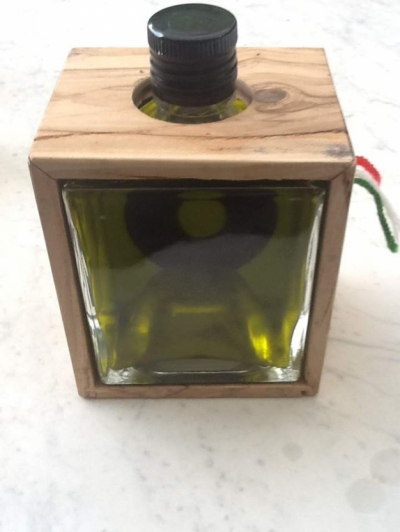Choosing the right container
Which are the best containers for storing extra virgin olive oil, and for retail purposes in particular? What are the best materials? What should we look for? How do we clean these vessels? Packaging is a critical factor, because oil cannot be sold unbottled on the retail market

Containers should be made of materials that release no smells and flavours, which would be easily absorbed by the oil. They must also not let any oxygen, moisture and light pass through, and ideally, be poor heat conductors. Finally, they should be easy to inspect, to verify that they are perfectly clean, and if possible, they should also be shatterproof.
Without doubt, the best material for storing oil is stainless steel, but tinplate steel cans are a more popular choice for the retail market; bottles and demijohns are also an excellent alternative, as long as they are made of dark glass.
Glass has been employed since the dawn of civilization to make vessels and containers for food. The hygienic properties of glass are superb: this material is very resistant to acids and alkaline substances, impermeable to gas and all liquids, does not alter the smell and taste of food and can be easily recycled. Its greatest drawbacks are its weight and fragility, which can impact heavily on the cost of the end product.
Tin-plated steel, or tinplate, is, as the name suggests, a thin sheet of steel that has had a coat of tin applied to both its upper and lower surfaces, which therefore become smooth, shiny and rust-resistant. Three types of steel are used to manufacture cans, and are designated as follows:
“L”, suitable for highly corrosive products;
“MR”, for moderately corrosive ones;
“MC”, for non-corrosive ones.
After the tinning process, the metal sheet is subjected to “passivation” treatments to limit the oxidation of tin, and coating ones, to delay any corrosive process triggered by acidic foods. Passivation can be classified as a decontaminating process, since it restores the passive state of stainless steel in a rapid and controlled manner, by eliminating all traces of surface contaminants, i.e. particles of non-inert metals such as iron that can cause the onset of oxidation and corrosive processes.
Tinplate is mostly employed to manufacture cans for sterilized food with a prolonged shelf life (fish in oil, meat in jelly, fruit in syrup, and so forth) but has now become popular for packaging olive oil.
Tinplate has many advantages: it is a light, resistant and non-breakable material that is both waterproof and easy to recycle. Among its drawbacks are its vulnerability to highly-corrosive foods and the fact that after some time, it gives a metal flavour to the food in contact with it. To avoid these risks, the inside of cans are now lined with non-toxic materials (ceramic coating, oleoresins, etc.) which prevent the metal from solubilising and corroding.
Stainless steel is an iron and carbon (0.1-1.5%) alloy containing other compounds such as chrome and nickel. Also known as inox steel, it is a strong, durable material that is both intrinsically hygienic and easy to clean, and for this reason is extremely suitable for preserving food. Nowadays it is widely employed for storing olive oil in bulk quantities. The main drawback of all containers is that the oil in them is to some extent, always in contact with the air. In order to minimize the noxious effects of oxygen, it has become a common practice to inject inert gases (usually nitrogen) into the vessel, flushing out any air present in the headspace. This technique requires the use of a manostat or pressure switch, an inflow valve, an outflow valve, a stainless steel vessel for the olive oil and a nitrogen- or other inert gas cylinder. When oil is drawn out of the vessel, usually through a tap placed at the bottom of the tank, an equal volume of nitrogen is automatically blown in.
Also washing the containers before packaging is a critical operation: cleaning must be accurate and carried out with appropriate, odour-free detergents. The best compounds for washing and cleaning these vessels are either caustic or baking soda, both of which must be diluted in warm water. The containers should always be well rinsed before use. The larger industrial tanks can be easily cleaned with state-of-the-art, hot water pressure washers, which expel a high-pressure stream of water (150-200 atm), at a temperature of over 100°C. Vinegar and scented detergents should always be avoided, because their smell is easily absorbed by the oil.
To comment you have to register
If you're already registered you can click here to access your account
or click here to create a new account


Comment this news